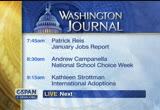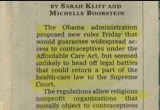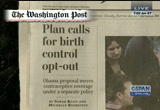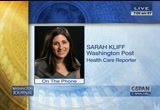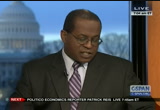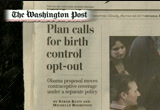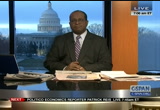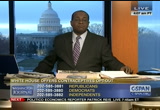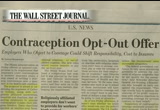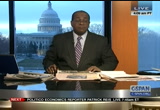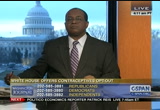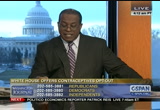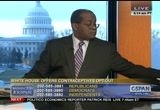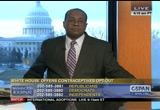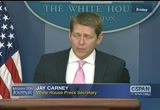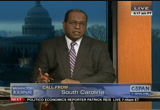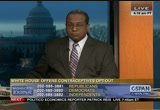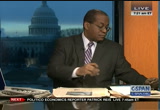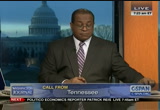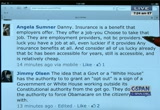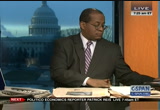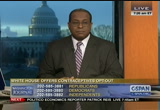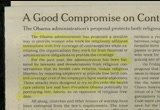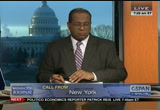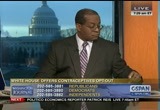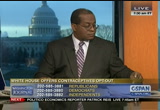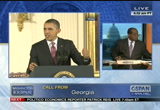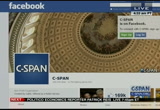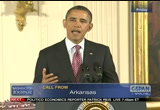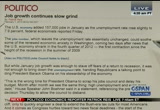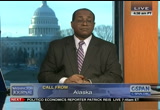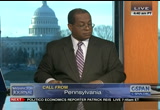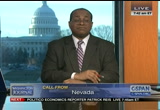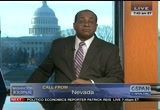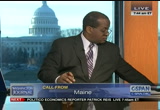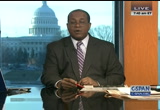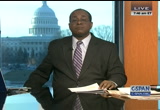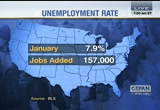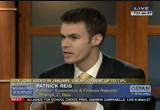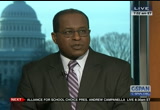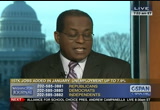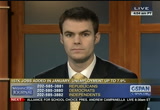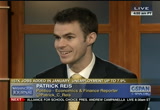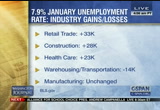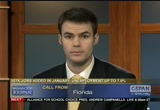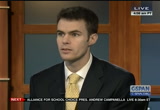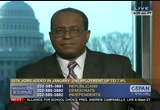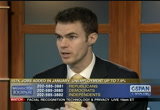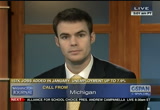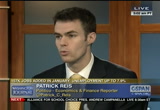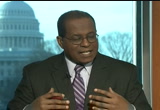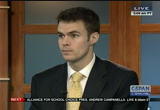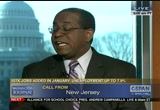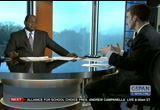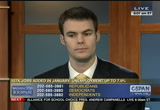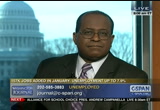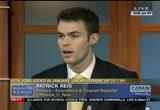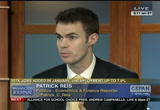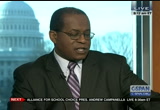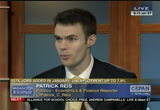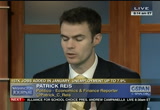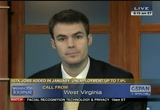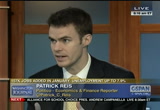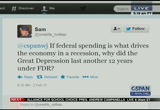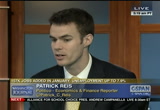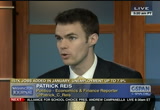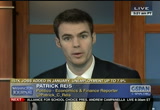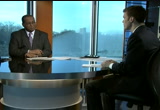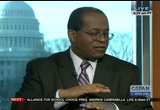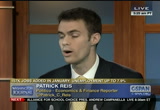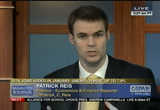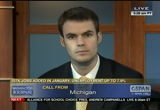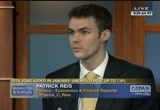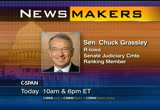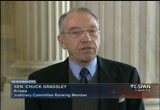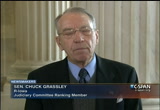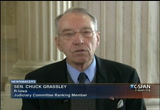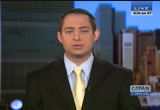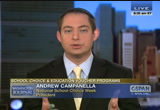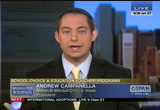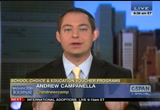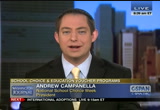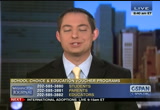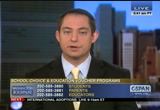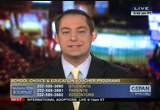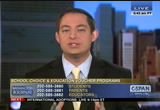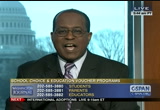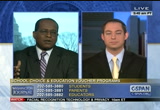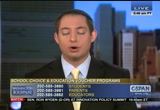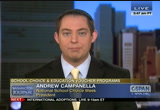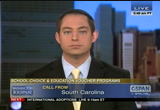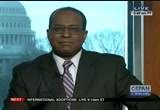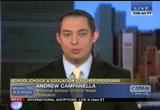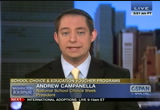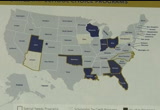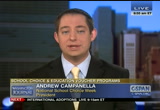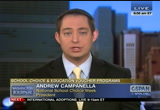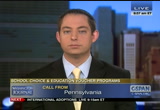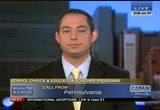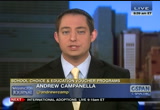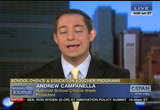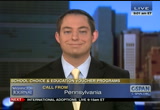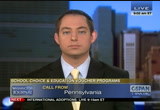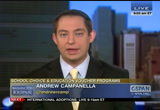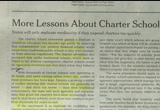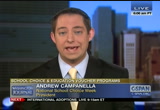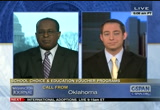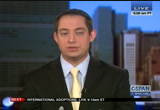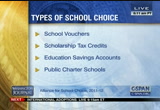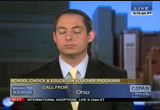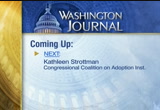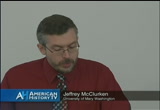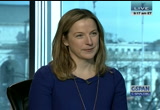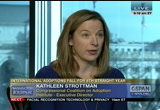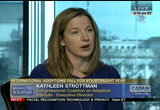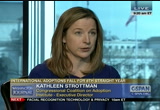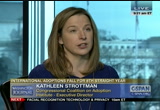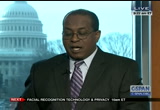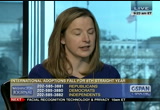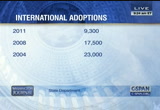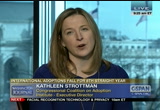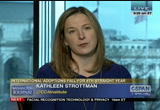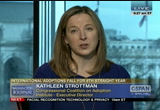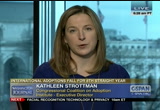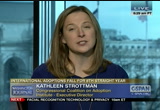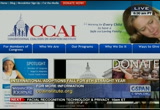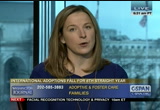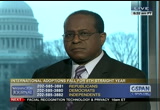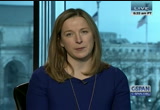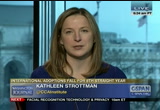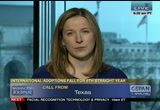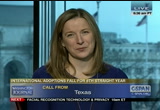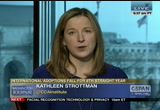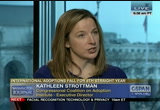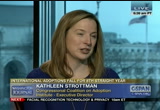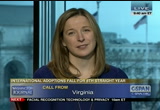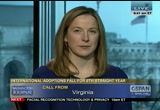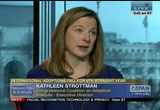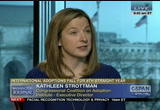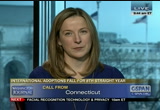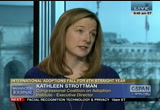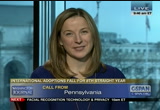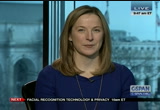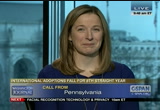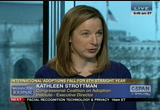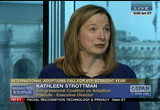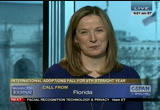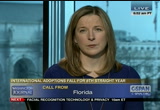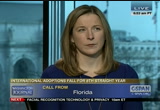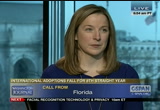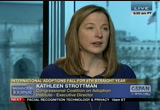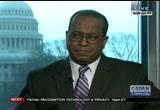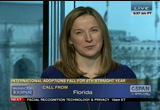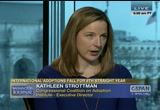tv Washington Journal CSPAN February 2, 2013 7:00am-10:00am EST
7:00 am
choice president on national school choice week and the heads of the congressional coalition on adoption institute on international adoption. ♪ host: the white house offers a contraceptive opt out. it is the lead story in many major newspapers. saturday, february 2. as it began in this edition of "washington journal," we began by looking at washington -- at "the washington post," an article about the lead. we want to find out what you think about this policy and the move proposed by the obama administration. the numbers on the screen --
7:01 am
7:02 am
on the line to tell us more about the story is sarah cliff. welcome to the program. guest: thank you for having me. host: why this opt-out? guest: the opt-out has been an area that has challenged the ministration for all but a week -- for over a year, trying to find a balance between reproductive health and also guaranteeing religious liberty. as to the wine now part -- they have promised since about a year ago, last february, they promised religious organizations and would come up with regulations that would find a middle ground. reason we're seeing it now is because i wanted to give
7:03 am
companies a heads up about what the compromise would look like. host: what has been the response from supporters of the president? guest: supporters of the president are happy with it. it seems to guarantee widespread access to birth control, regardless of who your employer is. host: opponents of the president's plan and say what? guest: say it does not answer their problems, for two reasons. first, there is no opt-out for a private employer or a local businessman runs a business, has a deeply held moral objections to birth control, there is no way for that employer to opt out. the second reason, as you described, there will be stand alone at birth control implants, and some organizations such as catholic organizations and hospitals, they worry when they pray -- when they pay
7:04 am
premiums to an insurer, money is moved around little bit, and they worried their money will ultimately pay for the birth control plan that they oppose. it is those two sticking points that are left. host: will this require are rewriting of the affordable care act, and if so, will it have to go through congress again? guest: it probably will not. there are a lot of legal challenges for this part of the law. over 40 lawsuits have been filed. they are only challenging a small part of the affordable care act. the last time it went before the supreme court, it had potential to take on a whole thing. we're talking about a small provision. host: sarah kliff, you mentioned lawyers working on a lot. might this have to be revisited in the supreme court?
7:05 am
host: yes, that is a possibility, and now it is looking like a likelihood, now that there have been over 40 lawsuits filed. it has been put on hold until the regulation cannot because they're waiting to see how the obama administration answers these questions. think legal experts -- experts do expect that we will see this small part of it before the supreme court yet again. host: we have been talking with srah -- sarah kliff. the plan calls for birth control opt-out. you can read it in hard copy if you are in the washington d.c. area. or you can find it online at washingtonpost.com. thank you for being on, sarah. more from the article from sarah -- wrote that some
7:06 am
religious groups criticized the rule for more than a year. they mounted a high-profile protest and filed dozens of lawsuits against the contraception mandate, are doing it is a violation of their religious freedom. -- the discussion for the first segment of the "washington journal" this morning, regarding the white house offer of all -- of an opt-out for contraceptives. our first call comes from bob, on our line for democrats from new york city. caller: good morning. what you just read in the article, it makes the case why religious institutions ought not to be tax-exempt and get all the
7:07 am
tax breaks that they do. they are using their tax breaks to hire lawyers that are costing the taxpayers even more money to basically just have a normal secular society. this issue of birth control, the rest of the world is laughing at us that we are even controverting over it. it should not even be an issue on the table. again, the tax-exempt status for religious institutions, i do not know if there are organizations that are trying to repeal this tax-exempt status, but i never really heard of a program on c- span about it, but these organizations, these religious institutions -- it is the tax breaks they get. host: nick from fairview,
7:08 am
tennessee. on the independent line. caller: this is a ploy. socialists like the kennedys and obama, they will vilify -- if they cannot get it right, kruschev said, we will take two steps forward, and one step backward. we no longer live under a constitutional republic. liberals claim that it is a religious group that is against them. the state has become the major religion in this country. the icons in washington -- they have to destroy every aspect of people who hold to a higher moral authority. host: the headline in this morning "the wall street journal" --
7:09 am
7:10 am
legal issue than a religious issue. the religious issue is for the contraceptive. i can understand that. why is this being mixed in with state issues? he did not have to take them if you do not want them, if you do not believe in them. don't use them. i just cannot understand why this does not go away. i am really quite tired of it all. thank you. host: more from the article in this morning's "the wall street journal." they write -- the new rules would require insurers to pay the up-front cost. our next call comes from carol
7:11 am
in ohio, on our line for democrats. caller: good morning. i am totally against what the catholic church and republicans are doing about birth control for women. this is an attack on women's right to choose. i had the right to choose in the 1960's and wanted two children, five years apart, because i was thinking about college. i think everybody ought to be able to make that decision what they are doing to women's rights -- make that decision. what they are trying to do to women's rights -- kinney to have a separation between church and state. the rights of women in the united states, have a right to birth control gigawatt it. whose rights are going to be -- if they want it. whose rights are going to be
7:12 am
trampled on by the republicans on this one? cannot like it at all. host: amanda from miami, florida. caller: art medical records supposed to be part of it? what kind of services with a note that are taken care -- would they know are taken care of? you work for a jehovah's witness and they do not believe in a blood transfusion, does that mean that they would not have to cover that? it does not make sense. host: more from the newspapers. this is the lead in "the new york times" -- a right that the proposal could expand the groups that do not need to pay directly for birth
7:13 am
7:14 am
doug from alabama on our republican line. caller: i am pretty much a conservative, however, being a catholic taxpayer, why should i have to pay, if i own a business, why should i have to pay for somebody's birth control? that is an individual responsibility. it is not something any company should have to bear or any type of after-pregnancy enhancement to keep pregnancy going. that is an individual responsibility. furthermore, the problem with healthcare -- they are telling me, your insurance does not have to pay that, but if somebody wants a different insurance policy, then the insurer has to
7:15 am
pay for that. what is the difference? there is no difference. thank you. host: our next call, rafah in michigan. you're on the "washington journal." caller: i was wondering why it was that seized and played the clip on the right-to-life movement last week, but they called it the anti-abortion movement. the question i really have is if koreshan is a natural -- abortion is natural and acceptable, why is it never shown on tv? they have so many operations that they have. if it is so natural and people find it acceptable, why do not ever see it on tv? is there a problem with it? how old does a child have to be before it can be killed? do we do it like a duke in
7:16 am
netherlands, up to two years old? host: we will leave it right there. we want to show you some of the white house briefing on friday where press secretary jay carney talked to the media about some of the positions the white house was proposing. >> the criteria he made clear that were important to him -- we need to provide preventive services, access to preventative services, for all women, including contraception, and we also needed to respect religious beliefs. that is the balance the president made clear he wanted to be kept in mind as these rules were developed. host: we're talking about the white house offering of contraception opt-out. our next call comes south
7:17 am
carolina, on our line for independents. caller: good morning. i think the biggest thing that is starting to trouble me -- i stopped pretend in the catholic church -- attending the catholic church last year -- when all this came out and the priest was talking about it, the thing that gets to me is, there is all this talk about people that want to focus on families, but we cannot keep our children safe in their schools, but people that may be questioning about what to even have children if we do not even know if they will be kept safe, the biggest issue that troubles me -- why is there all this concern about women and how we are taking care of our bodies when once we have children, how are we keeping them say it? i am troubled by all this. my chance -- a thank you for my chance to say this. host: we got a statement from
7:18 am
the catholic association. it reads in part -- your thoughts about the statement from the catholic association? caller: think if they were realistic, they would understand even though it may be frowned upon in the way that it is talked about, there are many catholics that use birth control. the family planning method is not being used as widely as it was years ago. they are completely out of touch with people that attend, the people that come to church, because they are having totally
7:19 am
different conversations going on. does not mean that we do not like going to church. there are two completely different messages being sent. women are not being respected. host: we will move on to linda from michigan, on our line for independents. your thoughts about the white house offering a contraceptive opt-out. caller: honestly, i do not think there should be an opt-out. if religious organizations want to keep their tax-exempt status, they should follow the law. you can add on the one hand and scream about abortion, and then fight birth control in the same breath. they are not paying for these children that would force into the world. i do not think they should have any say over what women do with their own bodies. host: in "the baltimore sun and" this morning -- "the baltimore sun" this morning -- they have a
7:21 am
i have a question that i need to ask you regarding the cost of the contraceptive coverage. how exactly does that work? is everyone that is in the plant's paying pour contraceptive coverage, whether they need it or not? host: that is something i cannot answer specifically, but i am sure there is plenty of it either in the newspapers this morning or at the white house website. i would suggest you check those out. caller: i am not referring to the proposal coming from the white house. i am more curious as to how the original law was written. my opinion would be that i do not feel that i as a man should have to pay for contraceptive coverage that i am never going to use. i guess you're right. i will have to go back and take a look at the original proposal
7:22 am
to see how that was written. guess i would say i do not think that is fair. thank you. host: we have a couple of tweets we want to take a look at. @ cspanwj is where you can send your tweets. this one -- also, this one -- also, this one -- back to the phones. cedric in gainesville, florida, on our line for democrats.
7:23 am
your ron "washington journal." caller: i was calling to get my point of view. people always think we are against everything to do not like. people cannot compel -- do not give a fair hearing. people should not a lot and have sex. you do not like something, do not given to it. you will not have been given to sex. all you have to do is to be the person you are. stop complaining about somebody try to help. host: robert in tennessee, on our line for republicans. caller: i have heard a lot of comments on the separation of church and state. there needs to be clarification that that goes both ways. not only do we need to separate the church from the state, but we also need to make sure that we keep the state out of the church.
7:24 am
these religious organizations that do not want to be a part of that, is part of the faith. as a catholic, i have to reiterate that birth control is considered for us as on the same level as an abortion. when you're asking somebody to participate in that, you're violating the religious freedoms. whether or not it is the same to make laws or whatever, you cannot be making laws that interfere with people's religious beliefs or practices. host: part of the conversation on facebook --
7:25 am
the conversation continues on facebook.com/cspan. back to the phones, dennis in schaumburg, illinois, on our line for independents. caller: good morning. i am a first-time caller. i watch you all the time. i am a pretty active environmentalist. one of my concerns is that we tend to take the quality of life away from our planet in order to
7:26 am
highlight the emphasis on our lives. my concern is that i think we missed the bigger picture when it comes to the pro-life issue. i'm going to give a quote -- i am pro-lifer for mother earth. please do not abort her. host: let's move on to beverly from chicago. caller: i am kind of tired about all of the separation between church and state business. no, they do not pay taxes. if they want to get into the debate, taxes like everybody else. all this moral authority that people keep throwing around -- mind your business. if you do not want to take birth control pills, don't take them. if you do not want the bothered with the morning after, don't do it. but we really do not have a
7:27 am
right to tell somebody else what to do with their own bodies. these states want to cut funds to medicaid, which takes care of poor children, sick children, and yet the catholic church -- i'm not catholic -- those of us who are not catholic, catholics do not take it. the rest of us, we take it. i pay for the oil companies to get all kinds of rebates and all of this business. i do not want to do that. it is part of my obligation as a citizen of this country. host: this is one of the editorials this morning in the new york times --
7:28 am
back to the phones. rosella in new york, on our line for republicans. you are on the "washington journal." caller: good morning. i have been watching this debate -- is quite controversial, obviously, regarding coverage for contraception -- contraception. over the years, i have listened to this. in fact, i have listened to it long before it became a hot topic, listening to and talk in different organizations.
7:29 am
host: what you think about the opt-out offer? caller: i think it is a good idea. my two points -- id not think religious organizations, churches, should have any business in this topic as a group, because they have a vested interest in women producing more babies. first of all, most of them, the catholic church included, and they are probably one of the best examples -- they like the women producing more babies because then they have more opportunity to run the adoption business. there is a fee for each baby, or else there always was, and then they adopt out. it is sort of like our voting
7:30 am
system. the more babies they produce, the more votes -- just to make it short, they have a vested interest in producing more babies, babies that are unwanted. host: we will move to do in tennessee, on our line for independents. caller: i am a catholic in my 80's now. i remember back -- i have always been against abortion. what got me was when i found out my church allowed abortion right up until 1869. then there would be no abortion at all when they found out about conception. they didn't know about conception until 1820. it took them until 1869. for the last 200 years, they actually allowed abortion right up to the time of ensoulment.
7:31 am
7:32 am
you can read more about that in this morning's "the "boston globe"." back to our phones and our discussion regarding the white house offering a contraceptive opt-out. carroll is calling from georgia on our line for democrats. you're on the "washington journal." caller: but me tell you this -- it is ironic that everybody who wants to get -- the churches, they want the right to opt out, and every time there is a situation that comes out, the catholic church always has a voice in everything. what they like, and what they do not like. the thing is, everything president obama has done has been a compromise for them.
7:33 am
they did state funding. how can you ask for the government to give you money, but then when they wanted to comply, you have a problem with it? like you said about the piece and the bishop and pope doing what they are doing, when you have this kind of thing on c- span, you can hear the hate in people's voices. it runs so deep. do they think about, when the church is giving the government money, should not abide by government rules? host: more from the conversation on facebook this morning at facebook.com/c-span.o --
7:34 am
back to our phones. our discussion on the white house offering contraceptive opt-outs -- terence at the little rock air force base, on our line for republicans. caller: my comment on the contraceptive issue is that i guess people are focused on one thing, and that is that the president is trying to support people who are trying to not have children. people overlook the issue that there are some women who have issues with medical issues. that is the reason why the use contraceptives. it should be allowed under the
7:35 am
church. they should provide it for that. caller: the next up is grace from long beach, on our line for independents. host: the modern family, either she has her tubes tied, or he has a vasectomy. i cannot take the pill? this way, you can space your children. i think this is rather stupid. host: that is grace in long beach, n.y., on our life for independents. more from the papers, in politico -- this is by patrick reis --
7:36 am
we will have more with patrick reis a political leader in the program. lincoln in indianapolis, indiana is on our line for democrats. caller: good morning. my comment is basically, raw every year, 50 unborn infants are killed due to abortion. as awful as it is, i support the catholic church. the best i can say -- host: we will leave it there. we have this from "the financial times" -- the last day of secretary of state henry rodham clinton as our secretary of state. the right -- they write --
7:37 am
the article goes on to say that she leaves office with the israeli-palestinian peace prop -- process languishing. the engagement with iran and north korea has produced no results, while political reconciliation that might have prevented another civil war in afghanistan remains a distant prospect. -- that is the take from "the financial times" on the last day
7:38 am
in her job, secretary of state hillary rodham clinton. back to the phones. logan in alaska, on our line for independents. go ahead. caller: hello, how're you doing tonight? host: hello, what is going on in alaska? caller: first off, warmer than usual. second, this whole thing that bugs me. i deal with people all the time, and everybody has an opinion with everything. kissell contraceptive thing -- his whole contraceptive thing thing is wild. how does anybody have the right to tell anybody else what to do with your body? it really bugs me that this is at an are doing state for this entire country. -- arguing state for this entire
7:39 am
country. host: what you think about the white house offering an opt-out? caller: i think it is a good thing. i think it is a step in the right direction. i think it is a good thing. host: former new york city mayor ed koch passed away on friday, and as you might expect, in the new york papers, it is their lead story. in "the daily news" -- a former mayor ed koch would often ask, how my doing? also, this morning, "the "new york post," there have line -- headline -- it is the editorial in a "the new york post" --
7:40 am
that is their take on the passing of ed koch, who was the mayor of new york city. nikole in pittsburgh, pennsylvania, on our line for republicans. caller: hello, how are you? host: your thoughts on the white house offering and opt-out. caller: as catholics, we do not believe in birth control. it is a joke. when i hear about choice, people have the right to make a choice, this is how women's health -- my father works for the catholic hospital of pittsburgh. she had u-turn cancer and got a full hysterectomies under insurance with no problem. i keep hearing that everybody has a right to do with what they
7:41 am
want to do with their bodies. why do i not have the right to pay for somebody else's birth control? it is ludicrous to say that i have to go against my conscience, my belief so that someone can take the day after pill, or whatever, but when it comes to women's health, she got the full hysterectomy under the health care plan of the catholic church. that is all bogus. host: nikole in pittsburgh. this is from "the new york times" -- they write out of istanbul --
7:42 am
and in carson city, nevada, on our line for democrats. caller: good morning, cannot believe the selfishness with how our country is becoming. i find things quite ironic. the mere fact that for years we have been paying for by agra. i never take by agra -- viagra, and yet a man, he does not want to pay for birth control. that is one thing. as far as the hypocrisy of the
7:43 am
church is concerned, what drives me crazy is that an infant is sacrosanct, but when there are day care centers, they are rampant with abuse. we have a result of overpopulation in our presence. i would like to bring to a point the thing that bothers me most that nobody wants to address in this country -- it is the overpopulation of this planet. when jfk was president, we only had 3 billion people on the planet. in the last 50 years, we have gone to 7.5 billion people. host: in "the baltimore sun" -- this is from william douglas -- nancy, on our line for
7:44 am
7:45 am
right to choose if we want to use contraceptives or not. i know when i was young, i tried many different types of contraceptives. i had a lot of medical problems from them. i could not take the pill when which theye iud's, took off the market, because they cause a lot of problems. i do not think people really look at some of the problems with contraceptives. i agree with a woman before, that if man can take viagra, maybe we should try something that men can take instead of just women. host: in the new york times --
7:46 am
next up, warren in michigan, on our line for independents. your thoughts about the white house offering and opt-out on contraception. caller: hi. it seems a lot of other people are independents, and that is because they have a right to opt out. this issue was brought up years ago. the archbishop from new york city, he had a speech in the early 1930's. the reasons he gave up for it or under-population, and certain
7:47 am
other things, but it came down to religious, they were against. by a wide margin, most catholics are not against it. just the church itself. catholic people are not against it. host: that is warren in michigan. coming up, we will break down the latest unemployment numbers for january with patrick weis. he is politico's economic and finance reporters. and we will discuss a national school choice week and the education options available to students across the country. first, we want about what's coming up on c-span2 and c- span3. 3's an2's booktv and c-span american history take -- american history tv ticket to santa fe, new mexico. that is coming up at noon -- a
7:48 am
visit to local literary landmarks, interviews with authors from the area. here is a clip from santa fe writer james morris as he talks about joseph pulitzer and his book. >> i am james mcgrath morris. behind me stand some early printing presses. this seemed like a perfect place to talk about the man who revolutionized american newspapers. what i for started working on the book, people would react with recognition when i was writing about joseph pulitzer. it was clear from their expressions of anger about the name and not anything about his life. he shares his fate with alfred nobel, which is being well known for prize, but not well known for what he did in his life. alfred nobel was an explosive munitions maker. few people understand the significant role joseph pulitzer played in american history.
7:49 am
yet like other giants of the 18th century, carnegie, morgan, rockefeller, kolter played a significant role in a critical moment in american history, which is the industrial age. that is the age in which america was made into what it is today. it is the birth of the modern mass media. before his time, we did not have the kind of media we now go through every day, the notion of americans check in the news on their phones, are going to cnn or c-span, these are things cultivated in that. -- in that period. he led a fascinating life, but his influence that he yielded is still with us today. >> to not put some -- such unlimited power into the hands of husbands. remember, all men could be tyrants if they could. if particular care and attention is not paid to the ladies, we are determined to foment are -- a rebellion.
7:50 am
>> abigail adams, one of the women who served as first lady and c-span's the original series, "first ladies: influence and image." this was produced with the white house historical association. season one begins present state, february 18, at 9:00 p.m. eastern and pacific on c-span, c-span radio, and on c-span.org. >> "washington journal" continues. host: patrick reis is with politico and writes on finance and economic issues. he's your to talk about the job issues -- the job numbers announced yesterday. the economy added 150,000 new jobs, but the unemployment rate ticked up to 7.9%, which is what we have there on our map this was also the lead story in this
7:51 am
morning's new york times -- on our map. this was also the lead story in this morning's new york times. patrick, explain how that works, more jobs added, but the unemployment rate goes up. guest: the economy needs to add up -- needs to create enough jobs to make up for people coming into the labour market. this month, we fell slightly short of getting there. it is worth noting, the unemployment rate has a margin for error of 0.2%. when it picks up a 0.1%, we say, it is essentially unchanged. there is a wiggle room for measurements. it is right around par. host: when these numbers come out, the numbers come out, and there is an explanation that they can be adjusted in a month
7:52 am
or so down the road trips -- road. guest: tell us about -- as more data comes in, debris-estimate how many jobs came in, and for december, they went from 155,000 jobs to 196,000 jobs. and in november, job growth was showing 146,000 jobs, which is a decent, but not during economics we're looking for, and now they are seeing that we moved up to vote -- to 247 jobs in that month. that is job growth that would succeed in bringing down the unemployment rate. host: 2 157,000 jobs, is that a good growth number, and what is needed for sustained or continued economic recovery? guest: it reassures
7:53 am
us that we're not sliding into recession. when we saw the positive number, we thought, great, we're not sliding into recession. it is not good if you are unemployed. it is not enough to bring a vast population of people knocked out of the job market by the great recession to be able to find jobs, come back in, but the rent, feed their families. host: we're talking with patrick reis. if you want to get involved, the numbers are on the screen -- we have added a special line for folks who are unemployed, and that number is -- 90 -- 202-
7:54 am
585-3882. our first call comes from mark in new york, on our line for independents. mark, you're on the "washington journal. i just wanted to make a comment. we were talking about this unemployment rate. i was watching the show yesterday, and there was a guy talking about the price of thing -- of things. in 1971, it cost $15 to go to a football game, and right now, the average price to go to the super bowl is $3,400. the unemployment rate and the jobs rate, it is not connected to the real world.
7:55 am
the average person is getting a job today is left out of just about everything. the cost of everything is so totally out of kilter with the amount of money you're making at any one of these jobs. the unemployment rate could be ten%, 5%, but how much are these jobs paying will -- in relation to the cost of everything? it is out of kilter. host: talk to us about the connection between price and cost jobs. guest: the caller makes an estimate -- an excellent point. the number does not describe the quality of jobs. we have other metrics -- average hourly wages grew by 2 cents an hour. that sounds small and indeed is small to go your try to take that to your corner store, but it is a bigger wage jump and we have seen in some time. -- than we have seen in time.
7:56 am
inflation and prices -- over decades, we have seen inflation. over the past few years, inflation has been fairly minimal. the number of people out of work rather than the price of goods -- economists will point to that. host: we're taking a look at the january unemployment rate. these are numbers we got from the bureau of labor statistics. you can find more of that information apps -- at bls.cov. -- bls.gov. -- from these numbers, patrick, we can glean what? guest: some transportation numbers are due to hurricane sandy. it shut down much of the east coast. it closed a lot of supply lines.
7:57 am
people who had previously been shipping and producing across the country, there were instead consuming goods they had already shipped in. the retail sector is encouraging, -- i do not know if that is the word -- economists are looking for an uptick in consumer demand. and i see people putting money into the economy, as when they expect the economy will take off and we will see the growth we need to bring down unemployment. host: dairy on our line for democrats. your on a "washington journal." -- you are on the "washington journal." caller: i would like to say in 2010, the republican house ran on the concept of job creation. hello? host: yes.
7:58 am
caller: in 2010, the republican house ran on the concept of job creation, and as soon as they got a majority, all they have done is try to repeal obamacare. the president is trying to appeal to congress on a jobs package to help the private sector. in a recession, government creates jobs to help the private sector to add up to make the numbers. what about the jobs, as republicans talked about in 2010 and when they won the house, and all they have done is try to kill obamacare -- think republicans need to be a thing of the past. host: we will leave it there. guest: republicans have argued that obamacare will actually put a drag on obamacare by imposing new mandates on employers. the counter argument you hear
7:59 am
from democrats is that providing a medical safety net for people that want to leave their current jobs and invest in an independent business and increase job growth. obviously, the law has not been implemented yet. we do not have much information about how it is going so far. to the proponents of the law, the argument is this -- you're in a job, you're not particularly happy, and you have an idea for a business, but you do not want to hop out and lose your health insurance, you do not believe you'll get without being connected to your employer. republican argument is, every time you hire somebody and you have different their health insurance, you'll be hesitant to hire. host: our next call comes from jim in chicago, illinois. caller: i have a question and comment. with the current job market --
8:00 am
it varies in the 7.8% rate -- people not about the long-term unemployment rate, which is a big issue. my question to both of you or are we going to do not just about training the long-term unemployed, but employers when they pick a long time unemployed person and they bring them on, you think you have to train them for a long time when you really don't. at the same time they're kind of scared to hire the person. guest: i think the caller makes an excellent point. as we look at the current unemployment picture we have to realize that this situation is something that's going to echo for decades in terms of how people are going to do in terms of what they can enjoy moving forward in their life. the unemployment number does not count people who have quit looking for jobs. it does count people who have
8:01 am
been out of work, even if you've been out of work for two years, if you're still actively looking for jobs, in theory you're captured by this number. of the 12.3 million unemployed, they are been unemployed for nearly six months or longer. that stress can effect someone's future going forward. host: chris, you're on the "washington journal," go ahead. caller: yeah, i kind of agree with the first caller, because even if this guy that's reporting the economic numbers are correct, which you are not because the people out here are really feeling the pain, but even if you are correct, the prices of things are going up tremendously. and then the second caller, who i can kind of prove it, who seems to support obama care, where my wife and i figured out now it's a new law and we've gone through all our finances, this is going to costous $3,000
8:02 am
more than it cost us the year before for actually less services. and to top that off, if the economy is going so well according to this guy that you have speaking today, my personal income has stagnanted or been reduced in the last five years. so the economy is not that great. host: chris, what kind of work are you in? caller: believe it or not, i'm a teacher that doesn't support all the union stuff going on. host: public or private? caller: public. host: chris in grand rapids, michigan. patrick? guest: what we're seeing is the economy is in a bleak space. there's a difference between the state of the economy and the direction of the economy. you know, we've gone from sort of a steep slide, to sort of a slow pull-up out of it. obviously that's very unsatisfying to people. if your real wages are down and you've seen higher gas prices or
8:03 am
higher food prices. there's a difference between a tumbling economy and an economy that's slowly pulling up from it. host: in the "wall street journal," they write that the labor report re-enforced the view that the economy is growing at a steady but excruciatingly slow pace. housing is recovering. the latest research suggests manufacturing has perked up after slumbering for a few months. so, you throw all that together, and like the headline says, it's driving a market rally. how do these numbers relate to an uptick in the stock market? >> well, i think it brings up an important point.
8:04 am
often times we talk about the economy, as if everyone together is in one economy and everyone experiencing it the same way. as it turns out that's totally false. just about 300 million americans, 300 million personal economies if you own stocks, this is a great month to be in that economy. if you're looking for a job, this is a mediocre month. if we look at these numbers we have to consider while we give them a general picture of the country as a whole, you can't tell them how any one jim -- now any one individual is doing. host: we're talking with patrick rice of politico, he's an economics and finance reporter for politico. and previously, he was the morning energy reporter and he also reported for everyone for e & e's. our next call comes from jack, on our line for democrats. jack, you're on the "washington journal." caller: good morning.
8:05 am
pleasure to talk to you. host: go ahead, jack. caller: i'm a teacher in the private school in this area, but i would disagree with my previous caller. the big problem in our economy as i see it is the offshoring of so many good paying jobs, and the destruction of the union in this country. when the globalization destroyed the floor for the middle class in wages, and as a result of that, these jobs are not coming back to this country. even offshoring technical jobs, like computer programs. it's outrages. host: jack in new jersey. to that we want to add this tweet from kiki who writes --
8:06 am
guest: i think for a lot of people what they see immediately is this employer who used to operate out of my town or city now operates out of a foreign city. the hope is that while this company moves jobs elsewhere, producing cheeper products, so leaving you more money to invest in other things and it creates net worth overall. you know, like we were saying before, the trouble is if you're the one who loses your job immediately, unlikely to sort of see these benefits come back to you where you may sort of be accrued somewhere else by another person or in another region of the world. so you can see how it's very painful to watch these jobs slide overseas, especially as the benefits of that are left tangible. host: mary is calling from phoenix, arizona, she's unemployed and is calling and identifies herself as a democrat. mary, how long have you been
8:07 am
unemployed and what kind of work were you doing before you lost your job? caller: actually, i've been unemployed for almost a year. i was in detection for credit unions around the country. i am collecting unemployment which is great because, you know, i have some money coming in. i participated in the work force program here in phoenix. they assist you in getting you ready for the work force today. i updated my job, more and less an adman person that can do almost anything in an office. so i did go for my microsoft office specialist certification, which i did get. i was just wondering, you know, why all the politicians are not
8:08 am
making job creation a priority? i feel for everything else that's going on in the country, and i'm certainly concerned about my country, but with over two million people out of work, me being one of them, i'm trying my best to, you know, all my circles to find a position, as well as anybody i talk to anywhere, whether it be the grocery store or a park that i'm sitting in, or whatever, to see if anybody else has any ideas -- host: mary, before i let you go, what would be the percentage of people in your immediate circle, friends, family, whatever, that are unemployed right now? caller: oh, in my immediate circle? host: yeah, half, a quarter, third? caller: it's about a third, actually. i don't like saying that, and i know it's been more. it's almost a celebration when
8:09 am
one of us get a job, you know. host: mary in phoenix, arizona. patrick rice, go ahead. guest: i think mary brings up a lot of frustration. hearing a lot of issues discussed in washington, and while they care about those issues, they want to know what about their employment, what about job growth? there are two rival philosophies in washington right now. it's prevented either one from putting their plan into action. president obama and other democrats are the view that if we have some sort of infrastructure investment and federal investment that can create jobs and drive demand, you know, sort of cycle through the economy and bring down unemployment. congressional republicans, their philosophy is that some of the regulatory hurdles that we have, environmental regulations, that's holding back job growth. so while congressional
8:10 am
republicans have enough power and congress to thraurt, democrats have the power to twaurt the mass regulatory that the republicans are looking to make. while both sides are sort of expressing their philosophies and saying this is what we want to do, neither side has the power to put that forward, so they look elsewhere to other issues where they may be able to find some common ground, such as immigration. host: we're going to take a look at four takeaways from january's job reports. we get this from "wall street journal."com, wsj.com. we already talked about the first two. i want to focus on the last two. the first is the pace of job growth looks better. for most of last year it looked like the economy was adding about 150,000 jobs per month. turns out job growth actually averaged a more robust 181,000 jobs per month for the year.
8:11 am
the revised figure reflects not just the november and december revisions but also the government's annual bench mark revisions which added 422,000 jobs for the year. the revisions now stand as the best year in terms of job growth, ever so slightly better than 2011 when the economy added an average of 170,000 jobser if month. with that in our rearview mirror, looking forward, does 2013 look to continue that trend? guest: there's some positive signs. we've seen a boost in the housing market, what's either pulled us out of the recession is a big uptake in the housing market. people build houses, buy houses, take out loans from their homes to buy more goods. we've seen some signs that it's been so shrug -- it's been so
8:12 am
sluggish for so long it's now picking up. the trouble is we've seen this before. a lot of times we thought ok, this is it, here we come, here we dom, and then something will happen that will knock us back into the slow growth rate. in 2011 people were expecting great things, and then the european credit crisis, as well as d.c.'s own fight over the debt ceiling. and then we were set to take off, all of a sudden we saw a big tumble in the stock markets and we saw job growth go back down again. i believe in august 2011 the initial report was zero net jobs. now they eventually revised that up to 100,000, but still an amemic growth rate. host: we continue our conversation regarding the 157,000 jobs added in january in the unemployment rate back now at 7.9% with patrick rice of politico. donald from statesville, north carolina is our next caller. donald is on our line for
8:13 am
republicans. caller: hey, how you doing. i'm calling from statesville, north carolina, and we got some bad news here. freight liner who was in cleveland, north carolina, is going to lay off 750 employees. trim systems that supported them, they're closing their plant, 65 employees down to two. but here's my question, you know. when they do these job numbers, lowe's down here is going to hire 45,000 part time workers. does that count in the job numbers? or those are not even included? host: sorry about that donald, i thought you were done. guest: yes, in the short answer is yes. part time jobs are included. in fact all you have to do is be employed officially on a payroll for one hour of the month and your job counts as a job. so, a lot of people point out that this isn't a measure of quality of jobs or how well the
8:14 am
people that have those jobs are doing, it's simply a measure of how how many people are on a job. host: now this tweet from charles1944 who writes -- does that help a person get back into the job market referencing what he had to say before about being long-term unemployed, employers look at that as a black mark on your resume? guest: it's difficult to keep pace with the new computer program that everyone's using, the office norms, if you're out of the game so to speak. i think, you know, the idea that there are all these jobs
8:15 am
available, you know i think is some what questionable. i think a lot of time people are unemployed because there aren't jobs that people can get, either because of where they're located or the quality of getting the jobs. host: next up is janette on our line for independents. you're on the "washington journal," go ahead. caller: yes, i would like to ask a question about number one, we have so much unemployment there's nothing really what is full-time. and in my opinion, insurance companies, if they had full time people, they should pay for them as they paw for the insurance. i pay for my insurance, $184. now they switched me over to something called mac. my husband worked for night source company for 31 years. well they bought his company out. he worked for them for 31 years. and then i have paid for the insurance another 30 years, or
8:16 am
31.5 years. now they're saying to me you only have $50,000 more of supplemental insurance and if you spend that, you have to keep an account open yourself, a letter was sent to me the other day saying that. so insurance companies rule the world it looks like to me. if they can do a 78-year-old woman like that, and i'm pretty intelligent, but you've got other people that doesn't really understand the insurance program, and it gets into politics, they're pretty well uneducated, being a housewife. caller: gennette, we're going to leave it there. guest: i think proponents of the law would say this is exactly the individuals in the circumstances that we're looking to help. this will put them on a steady, predictable track with the insurance. critics would say if you think this is bad, get ready, things are going to get worse. again like i said, it's sort of hard to know how that's going to
8:17 am
play out. but a lot of people will be watching closely. host: another report we're getting from wsj.com, talks about consumer growing strength. the improving housing market may also finally be showing up in construction employment which was 28,000 jobs and is up by 82,000 jobs in the past three months but manufacturing employment was seriously flat and fat coirs cut back on workers' hours. we sort of addressed a little bit about the areas that were going up, retail, housing, restaurants, et cetera. but manufacturing has, according to this, remained essentially flat. why is that? >> manufacturing is a difficult sector to coax. they are massive, you know, they sort of require a lot of
8:18 am
competence in the future to invest in the magnitude of machinery and facilities that you need. so before you'll see solid manufacturing growth, solid and sustained, people will need to have competence for long term demand and they're going to want to have a very good idea of what their cost structure is going forward, when there's uncertainty about what taxes will be, where federal spending will be, if we're going to implement osterity or cut back in spending. people are watching all that and what i hear from a lot of people is when we know what the playing field may be, we can make the investments. host: we've got a tweet here who writes --
8:19 am
are there any parallels? guest: the hole sisourg surrounding the great depression are an 80 year debate. -- the they will say the things he did, he sort of pulled us right in the right direction. but midway through that cut that back and went back to spending cuts and deficit reductions. critics say basically if they would have left it alone, if they would have left the economy alone it would have righted its own ship. the massive government spending of world war ii, that sucked a lot of people back into labor market at a terrible humanitarian cost got the economy back running. host: there have been some folks, part of the administration, part of the democrats that say infusing money and coming up with these
8:20 am
stimulus projects will help get the economy going. is this a similar situation to what f.d.r. tried to do coming out of the great depression? guest: threrp definitely parallels between the stimulus law of 2009 and what f.d.r. wanted to do. one major difference was where the stimulus sort of relied on the private sector. they had is civilian conservation core. this time they've tried to put money into contracts that private firms will get and then hopefully hire private workers. i think the thing about the stimulus is i bet 80 years from now we'll be debating how effective it was. what i didn't do was meet the unemployment projections that the administration said it would. but before one can say it's definitely a failure, one would have to prove that things would be what the administration is saying, things would be much
8:21 am
worse if we hadn't implemented it. host: back to the phones, ladonna calling on our line for democrats. go ahead. caller: hi c-span. if the private sector isn't creating enough jobs, then the government should step in and be the employer of last resort. why is not the jobs bills that are sitting in congress, how come john boehner is not passing these jobs bills? that's really what i want to know. host: patrick rice. guest: that goes back to the dead lock we were discussing earlier. if you were to ask john boehner, he would say the house has passed what we consider jobs bills, and indeed they have which would open up more offshore drilling and cut back on the regulations. democrats say we have passed job bills, and the trouble is when you have two different
8:22 am
philosophies and each with enough authority the thwart, what you see is a deadlock, so everyone's setting on their hands and hoping for everything to go better. it's an unfortunate situation if you're one looking to see government information in one direction or the other. host: on our line for independents from norfolk, virginia, mark you're on the "washington journal." caller: good morning, gentlemen. patrick, i just wanted to have you comment. everyone who called in is 100% correct from the first caller mark, he was dead spot. your wages do not stretch to the increase in product and services. and to the teacher who called in who talked about his wages being stagnant, again he's 100% right about it doesn't just relate to the teaching profession. what the problem is, is that capitalism does work. but capitalism is on steroids,
8:23 am
and that's why the businesses have over, maybe some say $2 trillion, $3 trillion on the sidelines, is because the fairness ratio has been blown away. and that's why the income disparity and wealth disparities are just crazy now. host: mark talks about the economy being on steroids and in the business section of this morning's new york post, they've got a mock-up of the fed chairman saying fed chiefs easy money policies fueled the dow's rise to 14,009. talk about what that means. caller: i think the last caller made an excellent point and something chairman bernanke would know as well. there's been a real effort to get as much money pumped into the economy as possible.
8:24 am
the fed has gone farther than really arguably and probably than any fed has previously, sort of do that and make that happen. a lot of it however remains on the sidelines. people have been hesitant to make those big investments, make those big purchases. so since they are sitting in safe, long term investments that may generate a slow return, but doesn't land anyone in a job. and so, i think you know, the question will be going forward at some point, you know, see this sort of massive build-up of money. will it flood into the economy, if it does will that increase rapid job growth, rapid inflation or both. host: what is considered full employment, patrick rice and what are the signs of full recovery? is there a number of unemployment that says this is where we're at? they're going to be a number of people that will always be out of work, but everybody else who wants a job can find a job and
8:25 am
has a job? guest: there has traditionally been a number. there's some question of it. you do wasn't some people to be unemployed, not because you don't want them to have jobs, but because you want people leaving jobs to find a better one. that's the sign of a healthy economy. to be clear, it's not that we want people to be unable to find a job, but we want people to take that risk. what's called the natural rate of unemployment was generally thought to be around 5%, maybe a little below, that would be a healthy economy. the fed right now is aiming for 6.5 unemployment at the current job growth rate, that won't happen for decades. so you need to see an uptick. the question is have we fundamentally changed the way our economy works, where that previous 5% is neither atannable nor desirable. host: one of the headlines this morning, january jobs again in
8:26 am
u.s., or jobs gained rather in the u.s., 157,000. we go to pete in lakeland, florida on our line for democrats. you're on the "washington journal." caller: hey, top of the morning to you gentlemen. i know you touched a little bit on downsizing. i mean the microsoft, excel format, making everybody a number for efficiency in the efficiency experts. but man, i think capitalisms on the way to die in the united states. you got companies right now that, if you want your high tech workers and you want a submarine, the college students and the current working class in america, you go to india and you bring them over on visas. you want to crush the white collar workers, i mean unions as far as industrial are pretty much dead. you move your plants to china and mexico. host: patrick rice, your response to what he had to say. guest: if he's arguing we're on the brink of a social
8:27 am
revolution, it would seem to me that, i can't see in the future and i don't want to say he's wrong, but we've been endured tougher economic situations in the past without peel launching a full-scale revolution. now if he's saying that we're looking at an economic downturn, i think there are a lot of economists who agree. we could be seeing an economy where essentially the wealth disparity rises. we have a smaller group who are taking home a lot of benefits of the economy and a very large group who are seeing very little of it. that's something a lot of economists are worried about. and so, i think the question going forward will be is that something that the federal combovement wants to address, -- is that something the federal government wants to address. or is it the dominant, american philosophy that the economy will play out as it may, they end up
8:28 am
where they end up. >> our next call for patrick rice of politico comes from jean on our republican lines. caller: my question is, if we have such high unemployment numbers in america, why are companies, especially foreign-owned companies, allowed to bring in employees on visas from the country that the company is owned by? for instance, a german company brings in a german receptionist. there are qualified, like the previous caller stated, she's qualified to do those types of jobs. but they are here on a green card taking a job away from an american. host: patrick rice. guest: i'm far from an expert on immigration policy, but the law generally states before you can
8:29 am
hire a foreign worker you have to prove that a domestic worker was unavailable to do that job. now, there's nothing to say that there aren't plenty of loopholes. i think the question is sort of on what scale are we seeing that? well, there certainly may be cases of that. i think before we pinned unemployment to that, we would have to know sort of how frequent that is and how often that's happening. host: if i'm sitting on the sideline and i'm unemployed what should i be looking to happen in congress between the congress and the white house in the next six to 10 months that may help me get a job? guest: i guess that depends on your political philosophy. if you believe that more government investing will work, that's probably not going to happen. if you believe a massive deficit reduction plan will work, you're probably going to have to wait five, 10 years. i think is one is expecting major economic policy changes to come out of the capitol, it's going to be a while. that won't be settled until one
8:30 am
party gains more power, actionable power. right now democrats can get anything through the house, republic conditions can't get much through the senate, democrats can't even get much through the senate. in the near future, very little. host: patrick rice covers economics in the financial sector for politico and has been our guest for the past 45 minutes. thank you very much for being on the program. guest: thanks for having me on. host: next, we're going to be talking with andrew campanella about national school choice week and the education options available to students across the country. and later in the program, we'll turn our attention to international adoptions, which have fallen for the eighth straight year. on newsmakers this week, senator chuck grassley, republican of ohio and the top republican
8:31 am
talks about guns. you can see the entire interview with senate judiciary committee ranking member chuck grassley this sunday, tomorrow, at 10:00 a.m. eastern time and 6:00 p.m. eastern time on c-span. also available online at c-span.org. coming up, we'll show a little about what the senator had to say about the overall lessons from the 1986 simpson mizoli act. >> could you, senator, give me one or two precise examples about the 1986 bill you would like to fix? >> well, first of all, we made it, we don't need to fix this part of it. but for the first time in the history of our country, it was made illegal for an employer to hire somebody without papers.
8:32 am
then that was based on the fact we had documentation that would show we were here legally or not here legally. so, that really ended up being a smokescreen, although we didn't anticipate it at the time. so, more secure documents for sure, but securing the border in a physical way, with personnel, with fence, with whatever it takes to make sure you can't cross the border without papers. the same way when an american goes into mexico. you wouldn't dare go down there without papers. so you don't want people coming up here without papers. and so, that wasn't anticipated and that's why the whole scheme that we thought would shut off the magnet didn't work, and so we legalized three million people based on that proposition, and now we reward
8:33 am
illegality, we've got a 12 million person problem. so common sense dictates that anyone who didn't go through it and had their head stuck in the sand didn't learn anything. but it looks to me like that paper shows they didn't study the history of 1986. when they put a statement in there that we're going to fix this once and for all. i hope they can do that, but in the final analysis it's my responsibility to make sure they do. >> senator, you called the 1986 deal amnesty. are you using that same word to refer to the proposal put out by these eight senators? >> listen, when ever you legalize anybody who did anything illegal, whether it's immigration or anything else, i guess i'd say you've give that person amnesty. >> "washington journal" continues. host: andrew is president of the
8:34 am
national school choice week and joins us from new york to talk about school choice and education voucher programs. the group, the national school choice group talks, actually is supporting giving students and families increased access to high performing public schools, public charter schools, virtual schools, private schools, and home schoolings. they see this as a solution to what they describe as a growing crisis of educational quality. welcome to the program. guest: thank you so much for having me. host: first, tell us what is national school choice week and how did that get started? guest: it is an opportunity for all people who believe that we need to improve education in this country to come together, celebrate school choice, where it exists and demand it where it does not. years ago in our country, we had a very simple system of education. they could pay their child to go
8:35 am
to private school or they could educate their child in the home. we now live in the 21st century. there's a global race for job. we're not doing enough to prepare this generation of young people to compete with kids around the world for the jobs of the future. america is being outpaced by other of dozens countries in math and literacy. so what national school week does, it gives everyone from a great traditional public school, like i went to for 12 years, public charter schools, magnet schools, access to private schools through tax credits or scholarships, online learning and home schooling. we choose everything else in society and parents should be able to choose their schools. host: what made your school so great to go to and what is going on in your school that isn't
8:36 am
going on today? guest: it's not that i don't see it going on, it's that i don't see it in every single school. i went to a great school with great teachers who were involved in my education. my mother is a wonderful public school teacher, so i think public schools are an essential part of the american education system. but they aren't the only part of it. parents need to be able to select the best schools for their kids and they need to recognize even though one school might be great for 99% of kids, if it's not right for your child, you should have options. think about going to the supermarket. you go and buy bread, there's a whole aisle of different types of bread you can buy. same with milk. think about when you buy a car, you have a ton of different options. when you send your kids to college, you have a lot of options there. why can't parents be able to choose the schools they send their children to. it shouldn't be based on zip
8:37 am
codes that were determined to figure out where mail is sent. host: we have a statement from the lawyers committee that we want to read to you, having to do with their take on national school choice week. they say -- this statement is oversimplified. those that support using federal funds to privatize our school system believe that doing so will improve educational quality and efficiency in public schools, as they compete to attract the best students, much like businesses. unlike a business, however, our public school systems must accept all students, not simply
8:38 am
those who are fortunate enough to be accepted. the nation's public school system was created as the great equalizer. they write, yet applying a business model based on competition and profit-seeking to our schools leads to inadequate outcomes for students, which is to the concept of education opportunity. the committee believes that all children should be given equal access to a quality education and we are committed embodied by the civil rights act of 1964 and the landmark round brown vrs board of education. what's your response? guest: it was clearly written by a lawyer, that's my first response. my second response, this is about kids. we need to refocus dialogue on children. this is not about bricks and mortar or the jobs of
8:39 am
beaurocrats, this is about providing parents with access to the best schools for their kids. just like we can choose everything else in american society. we are the country that put a man on the moon, that created vaccines that are healing people the world around us. to say that we as the greatest nation on earth cannot provide every child with access to a good school, to me, is ridiculous. national school choice week has been an amazing celebration. there have been 3600 independently planned, independently funded events celebrating school choice where it exists and demanding it where it doesn't. this is an issue whose time has come. it's time to provide every family with access to a great school, and no statement from a group that wants to keep the status quo is going to tell these parents that what they believe, that they know their kids best is wrong.
8:40 am
host: throughout the interview we're going to be referring to his website, school choice week.com, as well as a packet of information that we have from the alliance for school choice, with the title school choice now, the year of school choice. there's not a direction connection between your group and the alliance for school choice, correct? host: i worked for them for five years. they're a great organization. we work with them, we also work with 500 other organizations, 3,000 schools, public, private, charter, magnet, online, home schooling. tens of thousands of activists, so yeah i worked there before and they're a great group but now i work with national school choice week. host: our first call comes from al in cambridge, ohio, on our line for democrats. go ahead, al. caller: hi, just two questions
8:41 am
for you. you started to answer finally the first question. where is the national school choice week get their funding? and, the second question, on the last couple of week's news, garfield high school out in washington, could you comment on the teachers refusal to administer the standardized test? thank you. guest: to answer your first question, there are 3600 events going on, spanning all 50 states. these range from rallies at state houses to meetings at coffee houses, discussions in meeting rooms and living rooms. each of these 3600 events are independently planned and independently funded by individuals who care about the future of this country. so that's answer to your first question. now of course, we do have a very small, hard-working national team, and we raise money for our efforts, from people who care about school choice. and about the future of
8:42 am
education in this country. so we raise money for those efforts, we're able to do a kickoff celebration in arizona. we had an amazing 7200 person event, it was the largest event ever in school choice history. and a whistle stop train tour. but national school choice week is not a centralized planning operation. it's really a grass roots organic effort that is funded and planned by tens of thousands over people across the country, who either want to celebrate the great school options they've chosen for their kids, or are may don't have options, demand them. on your second point about teachers refusing to administer certain testing, i'm actually not familiar with that. but what i can tell you is that teachers have showed up to each of the national school choice week events. teachers are the second most important people in the classroom after the kids. host: anne on the republicans
8:43 am
line. caller: good morning, ana drew, how are you? i god to be a part of the event and found it to be very exciting. what can parents do to take an active rule to make sure it keeps moving? guest: first of all, thanks for coming out. thanks to school choice ohio, the northwest ohio scholarship fund, it was an absolutely inspiring morning. what parents can do right now is to take the message of national school choice week, which is patients know their kids best, and they should be able to choose the right schools for their kids. spread that message not just one week out of the year, not just one morning at the theater there in ohio, but every single day, every single week out of the year. write letters to the ed, call into radio stations, show up at committee hearings, contact elected officials and support whatever you believe is the
8:44 am
right avenue to school choice in your state. we're not telling folks to advance specific legislation or policies, that's not our role. but we hope parents will follow up on national school choice week and get involved, because from what i've seen, and the enthusiasm and energy of so many people involved in this history making week, if everybody can stand together like they did this week, we can really make positive change in this country. host: continuing through our discussion regarding school choice and education voucher programs, with andrew campanella from national school choice week, we want to hear from parents, students, teachers and administrators. our next call comes from ruth in
8:45 am
bowling green, ohio, who is a student. ruth, go ahead. caller: hi, my name is ruth anne johnson. i was a speaker at the toledo stop for the whistle stop tour, for the national school choice. i would really like to commend andrew for really reiterating the message for school choice. he really made the difference for me hearing him speak. he inspired me. i'd like to say thank you so much for letting me speak at the event. it was amazing. host: ruth anne, how old are you, what grade are you in and tell us about the choice you and your parents made about which school you were going to? caller: hi, i'm 13 -- host: ok.
8:46 am
so, 13, what is that seventh, eighth grade? caller: i'm eighth grade, yes. host: how did you and your parents make a choice on where you went to school? caller: i wanted to be an actress and a singer, and i wanted to go to an art school, and there was an art school locally, and i really wanted to go there and my parents just, supported me all the way, and we decided to audition and i got into the school and it was amazing and perfect. host: andrew campanella. guest: well, ruth anne, first of all your story in toledo inspired so many people. i would like to share that story so other people can know that school choice is not just a political issue, it impacts individual kids. ruth anne told the story of how she was bullied in her old school, and when she was able and empowered to choose a different school to attend, she was able to find a school community that encouraged her and welcomed her, carried for
8:47 am
her and loved her. and she then took that experience and created her own non-profit, called the b.u. foundation, like be yourself. she caught the attention of oprah winfrey and went on oprah. she is spreading awareness for kids to overcome the challenges they face in school, being bullied, being picked on. i can tell you that our whole team, and everyone who was at that toledo stop is telling your story in other places across this country. and what you are doing is absolutely amazing. i hope everybody will check out ruth ann's group, the b.u. foundation, like but yourself. school choice makes a difference, not just in academic achievement or raising graduation rates or increasing parents satisfaction. but it helps get kids out of environments that might work for other kids but where they don't feel comfortable enough to learn. that's important. we're talking about bullying a lot in this country, let's provide families with an
8:48 am
immediate option to get their kids into a school where they feel safe, happy and loved. host: next up is phil, a parent. you're on the "washington journal." caller: good morning, gentlemen, how y'all doing? i just, about a year and a half ago, left a situation where i had a son who had been for years with us, fighting their way through the public school system, and what you're advocating would be such a godsend here. we had to put him in an online school, because of things like bullying and lack of cooperation from the administration. the thing they didn't understand, i have, have and had a child, who would never be served by wearing -- by learning things like trig and callus, if he wanted to be on a college prep pathway he had to have that stuff beaten into his head. it just about caused him to quit
8:49 am
school. i think if we had left him in public school he would have quit school. instead we were able to find the online thing, which served him reasonably well. if we had been able to put him in a school which could teach him things about how to balance a checkbook and other various jobs it would have served him so much better. we didn't have that opportunity here. it would be so wonderful if we could grow the mindset. guest: phil, before i let you go, talk about how balancing a checkbook is different from basic math skills. caller: the thing is, it's not basic math skills. i don't know how long it's been since you were in high school. when you start talking about having three variables, i can tell you that my son will never have to work out an equation to succeed. if he does, we're all in trouble, because he won't be able to do it. it's not part of his makeup to do that kind of work.
8:50 am
we spent hours upon hours upon hours at home trying to forcefeed this stuff on him where he would have much better served if somewhere along the line in the eighth grade we had made some decisions and said ok, he's not going to be on a pathway that requires him to be a math ma tigs, but rather taught him some life skills. guest: let me tell you a few things, first of all, thank you for calling in. if you're looking for online, look into k12 national academy, they've been great throughout the last several years. i'm going to tell you my view that in this country we cannot write any child off. every child can learn. if we believe that and operate from that mindset we will be successful in educating every single chide. yesterday i had the high honor of going to a place of hope hall in rochester.
8:51 am
this is a school, a private school, that takes kids who traditional system might describe as having special needs. but, they go to hope hall, which is a wonderful setting, they love life skills, how to work with their hands, how to do things, and they love learning. they go where they may be uncomfortable or environments that don't work for them and they go to a place where they're carried for and loved and get the individual attention they need. when i was there, the woman who runs that school, sister diana told a story about a child who came to that school, and the paperwork said that child would never be able to speak, that that child was mute. and that child did speak yesterday, he gave an address to a hundred people and he's getting straight a's. i don't understand why we as a country cannot provide more families with the opportunity to send their kids to great schools like hope hall. finances should not be a barrier
8:52 am
for families with children who aren't being served in the regular system. that's not to say the system is totally broken or the schools are failing. it's saying that every child doesn't fit in one particular box. host: we want to take a look at a graphic we have from the packet from the alliance for school choice, 2011-2012. the total number of programs offered is 27. the number of students in private school choice programs is 210,000. the funds allocated or donated are $806 million from the 2011-2012 school year and the average scholarship amount, $3,0794 for private school
8:53 am
choice program. andrew campanella, explain to us specifically what is a private school choice program? guest: some new information came out last week about private school choice programs, both from the alliance for school choice and also the freedman foundation for educational choice. they're actually now about a quarter million kids in 21 states who are attending private school through private school choice programs. prove school choice programs empower parents to use the money they pay in taxes, essentially, to send their children to a private school of their choice. so, what we like to see, those of us who believe in all forms of school choice is parents be able to choose from great public schools through things like universal open enrollment lick public schools, and there are 17 states that offer that. charter schools that provide the innovative and creative schools,
8:54 am
magnet schools which are all across the country, 5,000 of them, online academies, 27 states have virtual academies that student cans go to. private school choice programs, there are 21 parents that empower credits with tax credits or scholarships. and of course homeschooling. there are six different types of options for folks who are supporting and participating in national school choice week that would provide parents with greater opportunity for their kids. host: next up is renee calling from east lake, ohio, renee is a student there in east lake. go ahead, renee. caller: hi, it is me, renee, and i was at the cleveland whistle stop tour, in the center. host: tell us about your experience there. caller: it was very fun. it wasn't of course the first time i was there, because our school always held a lot of field trips there, and i always had fun at them. host: what kind of school do you go to renee, and how did you and
8:55 am
your parents come to make that choice? caller: well, i go to ohva. my sister used to be in one school but she was picked on, so my family thought we should try something else, and they found ohva. guest: i hope you got your national school choice week scarf when you were at the event. i want everybody to see these scarfs. this scarf is worn by people all across the country during national school choice week. thank you so much for coming to our cleveland event. i have been totally touched by the outpouring of support for school choice week, and the vomit by virtual academies -- the ininvolvement by virtual academies. i just want to share a story.
8:56 am
the goal was simple, let's spread the word about school choice, give people a platform to celebrate school choice where it exists and where they don't have it, demand it. we pulled into some small towns along the route where they didn't have planned events. a hundred people came out in the pouring rain to welcome the train. i believe that online education and technology and education, digital learning, really is the wave of the future for school choice. it is not just plunking a few computers in classrooms or buying a smartboard anymore. it is actually connecting kids, whether they're in a school, public school, public charter school, magnet school, or in the home with some of the best teachers around the world via online and blended learning. it can make a difference for so many families.
8:57 am
host: our next call comes from dell, dell is an educator. and we want to show a picture of some supporters on the steps of the pennsylvania state capitol in harrisburg in january during the first annual national school choice week. go ahead, dell. caller: yeah, i'm a former educator, i'm in my 70's. i have a question i want to give you first, i want to give you also commentary. question being, how does school choice play into these other countries like india, china, japan, where they have much better success in the schools, for example. give me something about i.i.t., the indian institute of technology, how wonderful the results are, compared that to the united states. my commentary is this. i grew up in bethelehem and moved to allentown. they were a wide open city at the time. you had smoking areas, go to the bathroom and the smoke would be bill lowing out the door. no one seemed to care, nothing
8:58 am
was wild and crazy, but in spite of that we still have good results. i move to allentown where everything was real strict, everything was if you were caught with cigarettes, you got to work in the cafeteria half-hour. bethelehem, the school district is fantastic, where as allentown has been taken over by the state. this is all because of local control. we need more stroll government involved in the school system. in spite of what you're saying that would straighten things out. when you see a school system disintergrate like alens will town. it's just the opposite today. can you answer that? and can you also answer the question i gave you about school choice in those other countries that are doing very well? host: andrew campnella, president of national school choice week. guest: yes, there is school
8:59 am
choice in other countries. the netherlands is a great example. they have very robust school choice options for their families, part of their national fabric and school choice is not controversial there. because they've done it for so long and they know it works. i was in wisconsin the other day and we were talking with the governor and the mayor, and they ran against each other twice in two recall elections. and they both stood on the same stage in support of national school choice week. we asked governor walker why, what would you say to naysayers who says school choice doesn't work, it's been tried in wisconsin and it works, where it's been tried, it's worked. in all the places that have school choice programs, whether they're public school choice programs, public charter schools, magnet schools, private school choice, online learning or homeschooling, school choice is working for families. now when it comes to local control, i think the best
9:00 am
control every education is parent control. and let me tell you why. here's how parents can get together and when there are school choice programs, improve all schools. so you have one school that's a high performance public school. all parents a high performing public school. want to send their kid to that school. the lower performing schools says, "what is going on here? this other school has all these kids, all this demand. we need to do something to keep these kids here." they are going to pay teachers more money by cutting bureaucracy. there's a huge system of bureaucracy strangling education in the country preventing teachers from doing what they love doing, keeping money out of the classrooms. we can fix schools through healthy competition. that is what school choice
9:01 am
provides. host: next up, james from johnstown, pennsylvania. how are you doing? caller: i am 66 years old, and i was always fortunate. my father was an old servicemen from the get go from 1928 -- from the get-go from 1928. i always went to private schools. i went to a private subsidized school in philadelphia. i also went to the military academy in virginia.
9:02 am
i had a lot of private educators that worked with me over many years of my life. my question -- or my comment is i wondered weather the parents and students have forgotten their our schools -- i wondered whether the parents and students have forgotten that there are schools where children's did not have the opportunity to have a good education -- where children did not have the opportunity to have a good education. the freedom riders, the teachers were not up to par on teaching these kids, and yet, they were able to succeed and become college graduates, very well educated through a school teacher who taught them an awful lot, became freedom riders in their own right -- freedom
9:03 am
writers in their own right. guest: i think you are describing school choice at its finest with parents are working together with teachers and finding great environment for their kids. you described a few schools i have heard of myself. i want every parent to be able to make the choice to send their child to a school that works for them. we cannot assume that every child is the same and that one size fits all. a school might be working for a lot of kids, but if it does not work for your child, the school's scores do not make a difference. what makes a difference is your child coming home every day with a love of learning, being inspired, motivated, and challenge. it does not matter what kind of school anyone chooses for their kids but just that they have the choice. being able to choose is uniquely american. go to the supermarket. look at the bread aisle.
9:04 am
you have a ton of different types of bread. we have a higher education system that is the envy of the world. people send their kids to come to america from all over the world because it is a model where families do not have access to resources, there are pell grants for kids to have access to the education they need. america can be number one in k- 12. that is what national school choice week is about, elevating parents to be the single most dominant voice in the discussion of education in america. host: the lead editorial in this morning's "new york times" has the headline --
9:05 am
9:06 am
graduation rates are up. let me give you an example of how public charter schools are changing lives -- i was in phoenix, arizona, two weeks ago, and i went to a school that accepts about 20% of their kids from myanmar and burma. they lived in tents. there is a ton of violence. they came to the united states in hope of a safer and better life. other schools would not accept the students, but this charter school took them in and said, "we know that education is hard, and we are going to educate these kids because we believe anyone that comes to our shores deserves a shot at the american dream." the school that has taken 20% or 30% of kids from refugee camps, kids that did not know what a school or a bathroom was -- that
9:07 am
school is one of america's best schools, one of arizona's best schools. when i hear the "new york times," which has a vendetta unfortunately against charter schools, talking about closure schools -- charter schools when they do not work clothes -- close. it is almost impossible to close public schools. imagine if you had a hospital that mistreated its patients. there would be a public outcry to close that hospital. imagine if we had an animal shelter that mistreated animals. why then is there not an outcry when traditional public schools are not working to immediately turn them around? not a five-year or 10-year plan, but right now. give parents better choices, and if necessary, close the school down. we do close charter schools down when they do not work, but the vast majority do. host: next up is cedric, an
9:08 am
educator. caller: good morning. thanks for having me on. i have to disagree with much of what's andrew campanella -- what andrew campanella says. he says choice is not a political thing. it is a political football wherever you go. i do not mind the school of choice, but in america, we say that we will educate everybody. if you want to go to a private school, that is your choice, but my tax payer money does not go to that school. i am against the voucher system. two, most of charter schools fail. i do not know where andrew gets his statistics, but most charter schools are failing -- guest: they are not. that is not true. host: cedric, where do you get your numbers? caller: i am aware of most of the charter schools in a
9:09 am
particular city that are not doing well at all. in my home town, we have a school choice. we have the school of math and science, the school of performing arts, and then we have the school that is a regular junior high school. we have a high school that is a national school of health. those individuals having problems at the high school can go to another school. these are public schools. we have not even had -- we have not even thought about schools of choice. my grandson goes to a charter school in dallas, the taxpayer money does not follow him. host: andrew campanella? guest: two things -- what you described with parents being able to choose schools within the public system is a large part of what we are talking
9:10 am
about. let me clarify -- you are probably referring to magnet schools, which are public schools, and they are part of national school choice week. doing amazing work for millions of kids across the country. charter schools are public schools. they are publicly funded. the teachers are public teachers, they are successful, and they are educating kids at high levels. the only difference is that charter schools have more freedom to be innovative and creative. when we see that innovation and creativity, what we are finding is that they are educating kids at high levels. in places where there are charter schools, traditional public schools are doing better. it is unfortunate that you do not have such a high view of charter schools, but i encourage you to visit some. visit the ones that i went to. there are some amazing schools that are doing tremendous work in educating kids at the highest possible level.
9:11 am
host: explain to us what' kip means. guest: knowledge is power program. they are educating kids who some systems have written off as too difficult to educate. every child in this great country can learn. when we have a choice, when we have competition, when we encourage parents to be in the driver's seat of their children's education and futures, we find that all schools rise to the challenge. we need to be the generation that does rise to the challenge of history and provide every family with access to school. there is no other more important issues we face. host: we want to show our viewers a list of different --es of school choice
9:12 am
again, we get this from the alliance of school choice. next up is sandra from ohio. she is a parent. go ahead. caller: good morning. thank you very much. when you live in one of the largest rural school district in ohio, we are on our second year with a high school. the superintendent makes $153,000 a year. it was in the newspaper. there are still no high school buses running, and it is hard to get your kids to school or you
9:13 am
have to home school. there's a lot people here really upset about this. the great school buses run by our house is up to four times a day with zero to four little children on them. why are they not picking up the high school kids? host: andrew campanella? guest: the way we can improve systems and schools in this country and improve systems like you are describing is provide parents with more robust choice. national school choice week has celebrated school choice where it exists and demanded it where it does not. where parents stand up and say, "listen, this is not working for my child. this is not working for my neighbor's children." we need better opportunities within the school system and outside the public school system. that choice, the fact that parents are then in control forces systems to improve and respond more quickly to the needs of parents. that is how you fix the problem.
9:14 am
you do not fix the problem by having a five-year, a 10-year, 15-year plan. that is very cold comfort to a mother of an eighth or ninth grader to tell them that the school system or transportation system might improve within five years. the best way to shock the system and catalyze better growth and improvement is through school choice. host: we've been talking with andrew campanella, the president of national school choice week. to find out more, you can go to their website. thanks for being on the "washington journal" this morning. guest: thank you very much. at the national school choice week. host: coming up, international adoptions and to what extent the federal government has a role in assisting international adoptions. we will be right back.
9:15 am
[captioning performed by national captioning institute] [captions copyright national cable satellite corp. 2013] >> as we talk about the movie itself, it is not a stretch -- it is not a stretch to argue that "gone with the wind" is the most popular american historical film ever made. by one estimate, something like 90% of americans have seen the movie at least once. one historian noted that it became a worldwide phenomenon as well. the book was banned by the nazis while the french resistance saw it as a symbolic representation of strength amid occupation. the movie was one of two films requested by vietnam's leaders after the vietnam conflict as part of a cultural exchange between the u.s. and vietnam. in japan, the movie was turned
9:16 am
into a successful all-female musical. the movie is probably the single most influential interpretation of the civil war in 20th-century popular culture. >> "gone with the wind's" portrayal of southern culture, a lecturer in history, tonight at 8:00 eastern on american history tv on c-span3. >> john mccain's 2000 campaign when he ran for president is the most memorable campaign of any that i have never covered or been around. we will never see it again. here he was facing george w. bush, who had all the characters of the republican party backing him and all the money, and john mccain went out and held 114 town meetings, and he stayed there until every question was answered.
9:17 am
you could see the light bulb going on over people's heads asking about a patient's bill of rights, and john mccain would say, "we are not going to get a patient's bill of rights as long as my party is owned by the insurance companies and the wned by others." there was a candor and openness no one had seen before and no one has seen since. >> longtime columnist and political analyst mark shields on his career in politics and the washington press corps sunday night at 8:00 on c-span's "q&a." >> "washington journal" continues. host: kathleen strottman is executive director of the congressional coalition on adoption institute and is here to talk to us about international adoptions and how they have fallen for the eighth straight year. first, tell us what is congressional coalition on
9:18 am
adoption institute? guest: we are a not-for-profit organization just down the street here in washington, d.c., who is committed to the idea that every child in this world needs and deserves a permanent family to call their own. too often it is laws and policies in governments that prevent them from realizing this basic right. host: the first word in the title of your organization is congressional. what does congress have to do with this? guest: if you think about the way congress works, they have three important powers that they choose to use on behalf of the children. the first is the of this one -- they can legislate if we raise awareness about the policy barrier preventing a child from finding a family. with the stroke of a pen, they can change it. they also can convene and say, "we have a problem. too many children are languishing in foster care."
9:19 am
they can bring the best of all communities together to solve the problem. the third, of course, is the power of their voice. when they talk, often, people listen. they can raise awareness in their own districts and also highlight the problem. host: what is behind the recent drop in adoptions from international countries? guest: statistically speaking, we have longstanding partnership with countries like china and korea and russia, and these countries have done more to promote domestic options for these children and have done more to reduce the number of children they are placing outside their own countries dramatically. china in 2005 placed 14,000 children in u.s. families, and last year, it was a little over 2000. there's also been pressure on countries to look at their own systems to make sure they are avoiding any forms of corruption. oftentimes when countries do that, they completely suspend
9:20 am
international adoption programs, and the result is children stay in foster care or institutions. host: i believe that is the case particularly regarding russian adoptions. the headline from the "national journal" -- talk to us about what the situation is and how we got to where we are. guest: there was a piece of legislation passed by congress, and there was a provision addressing human rights issues in russia, and the russian people felt like it was a slap in the face. they chose to respond by passing a ban on adoption by american families. two things are a sad about this -- that a country would take action that ultimately hurts its own children -- two things are sad about this. that a country would take action that ultimately hurts its own children.
9:21 am
second, that the response has been largely from the u.s. and not from a world community saying it should not be this easy for a government to disregard the rights of children. host: kathleen strottman, executive director with the congressional coalition on adoption institute. you talked about domestic options, particularly in china. what do you say to people in the united states to ask about our domestic options and are there not more than enough children who need to be adopted in the united states? guest: we believe that every single child needs and deserves a family. the research on this is incredibly clear. if a child has a safe, loving environment as they grow, they will become the mature, responsible, productive adults every society needs to move into this next generation. we know this. but we often find that the systems in many countries, including our own, are not always set up to realize and protect this right.
9:22 am
there are enough families in this world to step forward for every child. it does not need to be an either/or situation. from the minute a child becomes separated from their biological family, they need to look to the community first for the best option for the child and continue to look outside the community or somewhere else in the world. one of the things about the record you just mentioned, it shows 100 children last year left the united states to find a permanent family in another country. i think this is another great example of what we do not say that a child's right to a family should be imposed by borders. host: we are talking with kathleen strottman. she's the executive director of the congressional coalition on adoption institute. the conversation is regarding international adoptions. if you would like to get involved in the conversation, the numbers --
9:23 am
and we have a special number for adoptive families. 202-585-3883 for families of bald in adoptive or foster care situations -- families involved in adoptive or foster care situations. talk about what congress is doing now to try to make international adoptions a smoother operation or process. guest: one of the things they did last year was recognize a criticism that had been lobbied by other world partners. before last year, we had a system where if the family was adopting in a country with a treaty was signed in the late 1990's to protect the rights of children and families in the adoption process, they had to be accredited by the u.s. state
9:24 am
department and show they have followed certain legal and ethical standards and were always engaged in best practice when it came to an adoption. we said that if you were not adopting from one of those countries, you do not have to follow the standards. you do not have to use an accredited agency. that was a mistake. so congress just passed legislation at the end of last year to say that any family that leaves the united states engages in adoption outside of our borders should have the benefit of an accredited agency, should have the protection of the laws and procedures, and we can say that -- to other countries that it is always in the best interests of the children. host: the number provided to us by the state department in 2011, there were 9300 international adoptions. that is down from 17,500 in 2008. down from 23,000 in 2004.
9:25 am
our first call for kathleen strottman comes from garland in ohio. go ahead. caller: good morning. thank you for taking my call. you sort of glossed over the question about domestic adoptions. you did say 100 american children were adopted outside of the country. is it a lot of cherry picking as far as which children they will adopt? you mentioned every child deserves a loving home. of course that is true, but you will acknowledge that many children are passed over for adoption. also, how many people who oppose abortion are out trying to adopt one of those unwanted children? guest: thank you. you raise some very interesting points. to address the issue of domestic adoption a little bit more, it is important for viewers to know that 57,000 of the 100,000 children available for adoption did find homes in the united states last year.
9:26 am
our organization and congress as well are very focused on how we can get to 100%. what we know about the 50% that are not yet finding families -- they are older children, children in larger sibling groups, and children with special medical needs. it is wonderful that what is happening right now is we are looking at our adoption system and asking if the laws and procedures in place are best able to help those families. there's a great program in ohio started by the dave thomas foundation that says, "we can find a child and family often in the community they are already interacting with." an aunt, uncle, teacher, volleyball coach -- whatever it might be -- and they have been able to place children three times -- at rates three times higher.
9:27 am
caller: i think she did give some information, but i was wondering, i guess, why now america seems to be concerned with picking up russian babies and why it becomes a political football between two countries as to adopting russian children. i guess my question is -- what is the reason behind it? why is it a political issue when we have other issues here, like the gentleman who just called and said we have enough kids in the country not being adopted right now? guest: it is an excellent question. what we need to focus on is was in the best interests of the children we are talking about? there are approximately 24 million children in the world living outside of family care. that means they are living outside of the type of environment we know is best for
9:28 am
them. this is not really a u.s./russia/guatemala issue. this is a global issue, just as we have tried to address war and conflict, democracy, human rights. we need to look at it that way and do everything we can, weather it be the u.s. or russian government, to make sure children have everything they need to become productive adults -- whether it be the u.s. or russian government. my organization is making sure the u.s. takes a leadership role because we have a lot of history and experience. it has taken us time to get to this place. one of the huge success stories is if you look at the early 1990's, we were only adopting about 20,000 of our children in foster care, and that number has doubled because of the policies you are calling for. we have learned from the experience and had the opportunity. we believe we should work with other governments so they can have that success. host: next up is steve from new jersey on our line for
9:29 am
independents. he has a son who caller: is adopted -- he has a son who was adopted. caller: we adopted our son 17 years ago from canada. he is almost 18 years old, and i'm finding that the paperwork -- i'm finding the paperwork, and he is not considered -- he is illegal actually. the judge and everything died, and now we are trying to go through a lawyer to try to find something that we can do before he becomes 18 years old to make sure that everything is ok. do you have any answers for me? guest: i hope you will contact our organization after this call. up until the year 2000, our laws or not structured assets that make it that when a child was adopted by a u.s. citizen, there
9:30 am
were confirmed as the citizenship of their parents. congress realize that in 2000 and passed the child citizenship act, but as you said, children who were not aware of that or did not benefit from it are still in this position of being here illegally. congress is aware of situations like your son's and helping to address it legislatively speaking next year, but there are things you can do to make sure he has his citizenship before it would be too late. host: if you want more information on the congressional coalition on adoption institute, you can go to their website, ccainstitute.org. we will leave that up while we take this next call, jodie in washington, d.c. go ahead. caller: i am wondering if through your work with the
9:31 am
coalition and the state department if you see some of the countries that have been closed or are in the process of opening up for enter country -- inter-country adoption like vietnam and cambodia reopening at some point. guest: we hope so. i'm going to be part of a delegation going to both vietnam and cambodia in february, and the purpose of the trick is to meet with lawmakers to understand where progress is and see if there's anything the united states government can do to facilitate progress -- the purpose of the trip. when we work with other countries, we want to make sure they have systems that enable them to observe the rights of children to find families and to make sure that, as we do in any partnership with any country on any issue, that we are doing so without opportunity for corruption or fraud. we are hopeful. these countries report that they have been able to put significant investment in to
9:32 am
such systems. they are looking for u.s. partnership. we hope if we can provide that partnership that they will be able to open up soon. host: we want to remind our viewers and listeners that in addition to the numbers for democrats, republicans, and independents, we also have a number for adoptive families -- 202-585-3383. next up, a call from south carolina on our line for independents. caller: [inaudible] host: we are having a difficult time with your connection. we are going to move on to build on our line for republicans. caller: thanks for taking my call. i do have many friends in the area that have adopted especially younger kids, and it seems like a lot of people do go
9:33 am
overseas for the younger kids -- there is a preference there. is there anything being done to help facilitate having more younger kids? say, like, with planned parenthood. giving options to have a family help out someone that is considering their options. i think a lot of people would support planned parenthood more if they were not just kind of pushing toward one side of that issue. it helps get away from the abortion issue. i think it is the right of a female to do what she wants, but then you get into the child but it's -- the child rights at some point. guest: you raise a great point. we work very hard from a policy perspective to make sure that first, a woman who is facing an unplanned pregnancy looking to understand her options moving forward completely understands
9:34 am
all of her options and feels supported with information in every case. that is something we are looking at, making sure that is correct and available in every community. we would look at any partners in the community that would be able to provide that type of non- directive counseling to families looking for that kind of help. it is also important that we have a process by which someone who might be interested in adopting is made aware of all of their choices. oftentimes adopt a pet families -- oftentimes, adoptive families will go in knowing they want to be a parent, but they are not sure of everything they can do. we talk to so many people who say they went into this knowing they wanted to help and went into it with some sort of image in mind, but then they met the child and anything they might have checked off on the box did not make sense anymore. we really need to make sure that
9:35 am
they are working with these families to explore all the options and have them understand what type of home they could provide for any child. host: we are talking with kathleen strottman, executive director of the congressional coalition on adoption institute, regarding the concern by some in congress over the fall in international adoptions for the eighth straight year. our next call comes from fort worth, texas. ann is an adoptive parent. caller: good morning. how are you? i have a different kind of concern. we have two biological children. we adopted an african-american child. my husband and i are an interracial couple -- i am black, he is white. when it came to the caucasian child we adopted four years ago, that adoption was much, much different for us. it was harder. even though my husband is
9:36 am
caucasian and i am black, it was much, much different. it was as if there were barriers put up. we did not want to adopt outside the country because there are enough children in this country to go around for everybody. if it comes down to giving children eventually what it will be asking about, which is their heritage in the end -- i do not think enough love in the world could answer enough of those questions, but that is why we chose to do it. i want to know how frequently it happens to where there are barriers put up if there is a black person in the marriage. it really seemed as if we were discouraged -- and i will hang up and listen to you -- because that is what no one talks about. guest: i appreciate your call. as you know, we actually had
9:37 am
laws that prevented children from being placed in families that were not the same race until the 1980's. it seems that while the laws have changed, some of the attitudes and the reasons behind those in the system have not, and i think you raise an incredibly important point. adoption is meant to give children -- give children an opportunity to be raised in a safe and loving environment and develop a normal and healthy relationship and go on to be productive citizens, but it does not mean that a child who is adopted is meant to erase their past, not understand where it is that they came from, whether that be their culture or heritage, and we encourage families who adopt a child to recognize that. to really help a child understand everything about who they are and to celebrate that and make it part of their daily family existence. these are two things that, as you said, are not necessarily as prevalent in the adoption system
9:38 am
as they should and could be. host: you talked before about american kids adopted by international families. tell us more about that in terms of what kinds of protections are afforded to those american kids that go overseas, and our this adoption rates going down as well? guest: actually, they are going up. we recognized that there were children in foster care who the system had tried to find families for in the united states, and either because they were older or have certain characteristics that the community was not responding to -- sadly -- there were families in ireland, the netherlands, canada who said, "that looks like my child. i would like to begin the process." whether it is u.s. adoption of a child from russia or from here to ireland, the government has put together that system that ensures that the child's rights are protected in the process,
9:39 am
the birth parents' rights are protected, and the adoptive parents'. in the beginning, the child understands they will be leaving the country. they understand what that means. these are the types of things that are supposed to be insured happen in the process. one of the issues parents will raise is the most immediate challenge is the language issue. you hear stories about families coming on a plane back from, let's say, correa -- korea and it takes a while before the child is able to communicate. i am and parent of three children, and i have to say i know everything my child needs even though he cannot yet tell me. the great thing about the relationship when the bonds starts to form is there are ways to communicate outside of
9:40 am
language, and it is a beautiful thing to see the way a parent is able to get them things that they did not received in an orphanage before. host: our latest call for kathleen strottman of the congressional coalition on adoption institute comes from fill in virginia, who is an adoptive dad. caller: my wife and i recently adopted a baby girl domestically. it was a five-year odyssey with many near misses and very stressful, very challenging, lots of per -- prayer. i just want to encourage those in similar circumstances. my wife and i were almost ready to give up, but it came through. she is beautiful and wonderful. we did it domestically. i am in the military. we also have an older daughter.
9:41 am
we did not want to leave her behind. i just want to let those out there who are seeking to adopt domestically know that there is hope. there may be many near misses and other events that occur, but it is worth it, and it will happen. host: can you hold on for just a second? i have a tweak hear from a viewer who writes in to the program alive -- i have a tweet here from a viewer who writes in to the program a lot. as a member of the military, do you know anything about this? caller: they do provide money for system adoption but not necessarily foreign adoptions. it is not a large sum of money, but it is enough to assist in overcoming some of the financial challenges. we had to save up a lot of money just for this domestic adoption.
9:42 am
a co-worker of mine who did a for adoption in a former soviet union country face significant challenges there, and they do not pay us a large sum of money, but it is enough to help offset some of the expenses that occur. host: thanks for the call. kathleen strottman, tell us more about what if anything the government does to help facilitate international adoptions? either greasing the skids with passports or providing any sort of financial assistance. guest: i did want to point out that the department of defense is probably like many employers to understand that forming a family through adoption can have expenses that are somewhat unique and often not covered through things like insurance, so to their credit, they stepped up and said, "we want to be part of that as well. we want to be part of helping children find homes." so they do provide assistance to
9:43 am
their employees. one of the things we also know about adoption, no matter what type of adoption it is, it comes with expenses, as was talked about by phil. if you are talking about an international adoption, it could be the cost of an agency that assists you abroad. it could be the cost of traveling -- sometimes you travel back and forth to the country three or four times and stay two or three weeks to assist in forming the bond. we know many families make under $80,000 a year combined, so we are not talking about people of great wealth, so these types of programs are important. but congress has done recently is to reauthorize the adoption tax credit, which is available to any person who adopt a child
9:44 am
-- weather it be here in the united states or from around the world -- whether i tb here in united states or from around the world -- and hopefully, that are able to use -- hopefully they are able to use that for expenses. host: our next caller is from kenneth. go ahead. caller: i have been watching and listening to c-span. my comment is that most of those who take care of the children domestically or for an or however they do it -- listening to your show earlier, you have people of religious backgrounds or whatever complaining about abortions and this, that, or whatever, so if people have children, they have to be taking care of them, so we get so many complaints about food stamps and medicare and the thing about the
9:45 am
kids coming from different countries doing this, that, and the other, and the parents that come here and work. when we have children, they have got to be taken care of. if we are against abortion and every other thing, we need to quit complaining about assisting the children once they get here. host: kathleen strottman, talk to us about how the children are monitored by the government, the state department, or whatever agency works on these international adoptions once the children are here in the united states. guest: the thing that is beautiful about adoption -- once they come here to the united states, they are no longer treated as adopted children, so they are protected in the same way as a child born to a biological family. that has become part of the discussion with the russian government. they want to make sure that the system will make sure if there is a case of abuse or neglect that it will come to the
9:46 am
awareness of the system. could it be better? absolutely, and my organization always talks about how it could be better. but we do have a system where if a doctor or social worker makes sure that a system is told if they see something wrong with the child. the calls we received last year turned out about 50% of the time not to be of use, but those that were, of the children were protected by the system. host: our next call comes from phoebe. she is an adoptive mom. caller: that is the best thing my husband and i ever did -- we adopted two sisters from korea around 1975.
9:47 am
they are old now, in their 40's. they have given us beautiful grandchildren. i have heard now that the koreans do not allow children out as easily as was the case in our case, but it was a wonderful experience, and i am always internally grateful, so thank you. host: was there ever any consideration between you and your husband to adopt children in the united states? caller: yes, actually, that is a story. i lived in new jersey at the time. i have three natural biological sons, and i wanted a daughter. i called the state of new jersey -- because we did not have any money. we are school teachers. the woman who answered my call asked me what my race was and said i would have to wait for five years because they did not have any white children and would not let any black children go to white people. i was a big civil rights activist back in the day, but,
9:48 am
you know, maybe if they had -- maybe if we had had black children, they would have had a problem in our house. i do not know. these girls are certainly not our race and looked really different and foreign when they first came, but they became cheerleaders and curl their hair -- curled their hair. i often feel guilty because i did not do much to keep their culture alive for them, but they seemed to want to unload their culture. they were four and two and a half when they came here. they had been separated. one of them came from an orphanage and the other from her mother. they were reunited on the plane when they came to us, which must have been a horrible experience -- a 25-hour plane ride when you are two years old. but our boys and they charmed
9:49 am
each other. they could not speak each other's language, but they played these games, and it was a wonderful experience. it brought our family together. host: thanks for your call. guest: one of the things we're working on as it is often difficult for people who want to adopt a child out of foster care to do so. thank goodness we are moving past the idea that race is the ultimate factor, but oftentimes, there are things about the with the foster system works. a good example as i know a man who is a father of five children. he and his wife were in their early 50's when they decided they could provide a home for at least one more. he said in the first meeting they were told they were too old and had too many children. he is one of those people that i would be adopted by tomorrow if they could let me. their family is perfect. sometimes there is a checklist
9:50 am
that a social worker is given, and it comes from laws and policies that need to be changed, and they say, "we are not allowed to. we believe in our heart of hearts you would be the right family, but this checklist is something we cannot get around." so we ask about the things that are in place, what is there to protect the child and what is actually just getting in the wake of a child finding the love and hope they should be getting -- getting in the way of a child find the love and hope they should be getting. host: if a couple is told they are too old to adopt an american child, how do they buy past that hurdle to adopt a child overseas? guest: every country is allowed to come up with its own criteria. china has a very stringent standard as to the collective age of the adoptive parents. you have to go through a medical exam. if you have a certain heart rate or below, you cannot adopt a child in china. that is up to the sovereignty of
9:51 am
each government. we want to make sure any policy the government has in place are meant to make sure that the home child would receive is safe and appropriate and that they would get the love and attention they would need but not an arbitrary distinction that could prevent children from finding families that would be more than willing and able to care from them. host: eric is calling from florida on our line for adoptive families. good morning. tell us a little bit about your story. caller: my fiancee -- when i met her, she was a single foster parent. she told me that i was getting into something that -- you know, i was getting into something. over six years, we have taken in more than 350 children. i hate to use the word like a
9:52 am
holding station, but when there were these drug busts, they would give us a call at 3:00 in the morning and bring a child to us, or if there was a parent voluntarily giving up their child, we would take the child. some of it was short term -- a lot of it was short term -- but then there has been a lot of it that was long term. there were situations where we would have a child in our care while another family -- the state would make arrangements for another family to take the child on. this is why i'm calling. the guy who had the comment about cherry picking -- well, i'm going to make a comment. they have lots of programs where you can try it before you buy it.
9:53 am
if you are going to be an adoptive parent, you can obviously foster first. you need to qualify for foster first, of course. so they allow these people to foster for months, and they allow them to go to the court and it is finalized and over, and it is at no cost. host: before i let you go, let me ask you two questions -- were all of your foster children from here in the u.s., or did you foster from into -- did you foster some international children? caller: no international at all. that is another thing that is confusing to me. just in polk county alone, they are overloaded. host: you said you fostered -- i guess you and your now wife? caller: we are not together anymore.
9:54 am
host: you said over 350 children? how long a time frame? caller: there were some that were three to five days -- host: know, 350 children over what time frame -- no, 350 children over your time frame. caller: we were together five years, and we split a year-and- a-half ago. host: 350 kids over five years, that is a lot of kids in a short time. yes, it is. for some, it was while their parents were in court, and for some, it was until parents were found available. host: talk to us about a foster situation with international
9:55 am
kids and how long -- is there a requirement for how long they need to be in the united states or be with a particular family before they are put up with adoption? guest: we actually do not allow children to be fostered by u.s. families if they are born abroad for a lot of reasons. you do not want to remove the child if you are not sure. foster care should be in every country a temporary situation. it is an institution so you can put a child in a family environment and keep them there. when we work with governments from around the world, 67% of the children adopted out of our foster care system are adopted by their foster parents because you make that immediate connection. as was said by eric, you address fears and concerns you might have going into the process because you already have the connection with the profit digit the connection with the child. it is a good idea -- because you
9:56 am
already have the connection with the child. it is a good idea. about 60% of the children in the foster system go home to their families. it is important to remember that only 40% of the children that go into foster care will be eligible for adoption. all of them do not go into adoption by a non-family member. states are meant to look into the media biological family and see if they have a kinship situation that can be put into, maybe a grandparent cannot adopt formally but can be a legal guardian. host: what kind of support is offered by your group or any other group, the congressional coalition on adoption institute, for promoting adoption by same- sex couples? guest: we say there is a home for every child, and as we were talking about with race, there should not be a distinguishing character. i of the court finds that a
9:57 am
family is the right family for the child, they should do that -- if the court finds that a family is the right family for the child, regardless of race, religion, or homosexuality. it is just not an issue for us. host: our next call comes from robert in florida on our line for republicans. caller: good morning. i have been listening to your program for a little bit, and while i see it as being honorable and good-intentioned, as you have heard from so many other colors, we have so many children in the united states that need to be paid attention to. with our school system and lack of support for education, it seems to me that while you are a very nice lady and ensure you do a very nice job of pulling some dollars out of our tax burdens, i would like to know where your funding comes from, and how come you can have some would be too old in the united states when we are supposed to
9:58 am
be the land of the free -- how can you can have someone the two old in the united states when we are supposed to be the land of the free -- host: we will leave it there. guest: we receive no government money. we received our funding from individuals who support our cause and want to see our work be successful. we are not a government entity, and we do not receive government money. it is coming up over and over again -- the congressional coalition on adoption institute -- what we believe is that every single child in the world has the right to a permanent family, and we work to make sure that every single child in the world has the opportunity to have that right realized. we fight just as hard for the children in the united states find families. host: our guest today has been
9:59 am
kathleen strottman from the congressional coalition on adoption institute. to find out more, you can get more information at ccainstitute.org. tomorrow, we begin with a conversation with marc ginsberg, who will be here to discuss the increasing unrest in egypt and syria and how president obama's new foreign-policy team might approach these and other global hot spots. we will also have the president and co-founder of the migration pulp -- migration policy institute to discuss the 1986 law to control the flow of illegal immigrants in the country as well as provide a pathway to citizenship for those already in the country at the time. then we wrap up the program with the president and co- founder of women's rights rl
195 Views
IN COLLECTIONS
CSPAN Television Archive
Television Archive  Television Archive News Search Service
Television Archive News Search Service 
Uploaded by TV Archive on

 Live Music Archive
Live Music Archive Librivox Free Audio
Librivox Free Audio Metropolitan Museum
Metropolitan Museum Cleveland Museum of Art
Cleveland Museum of Art Internet Arcade
Internet Arcade Console Living Room
Console Living Room Books to Borrow
Books to Borrow Open Library
Open Library TV News
TV News Understanding 9/11
Understanding 9/11